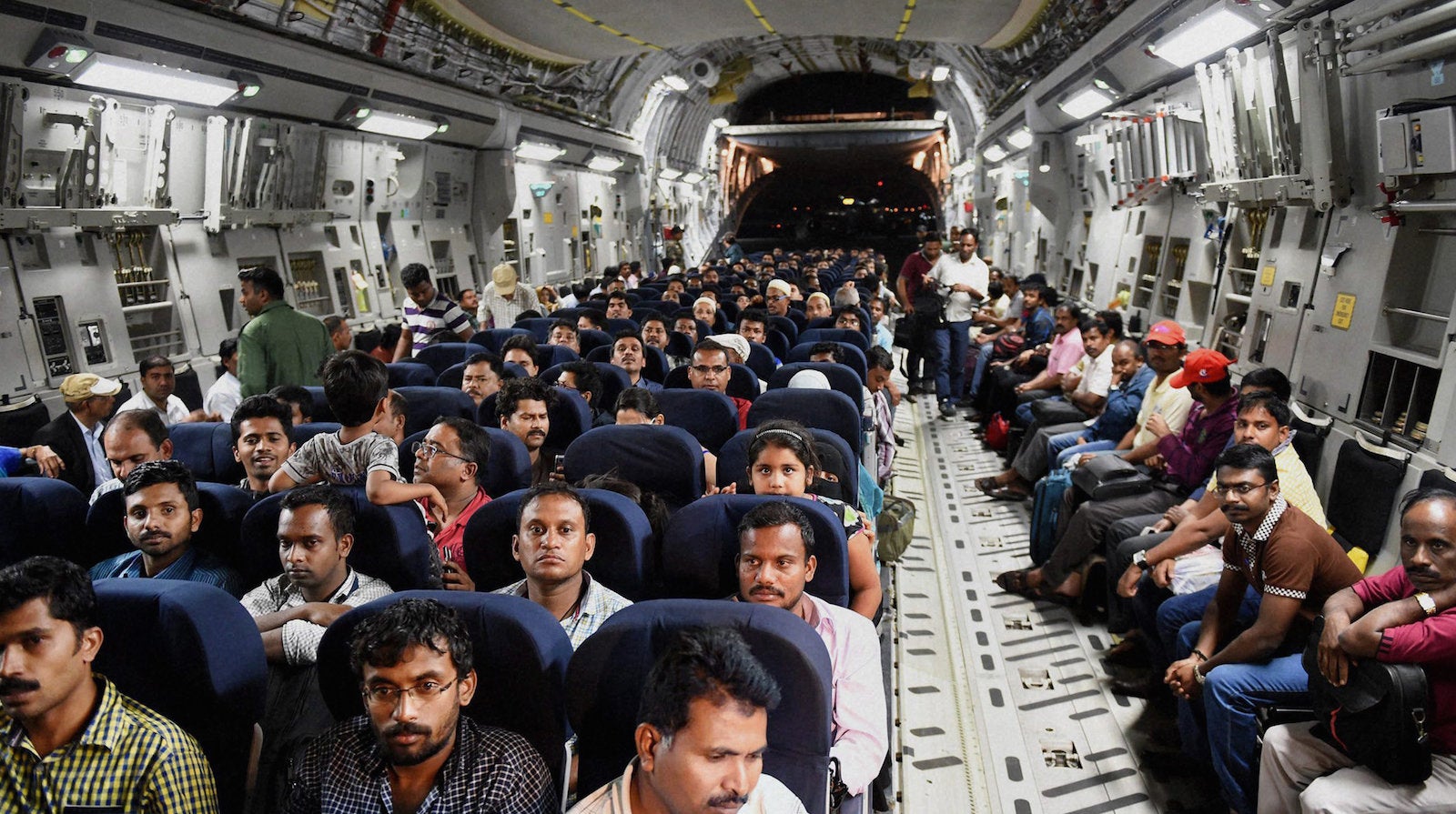By sea, by air, by rail: How India is pulling off one of its biggest rescue missions abroad
India is in the midst of one of the largest rescue missions from a foreign country.


India is in the midst of one of the largest rescue missions from a foreign country.
Codenamed Operation Raahat, the mission was launched in the last week of March to bring back Indians from war-torn Yemen. Raahat means relief in Hindi.
“We are sparing no effort. The situation is very complex. The airport is with Yemen, and airspace (is) controlled by Saudi Arabia,” India’s foreign minister Sushma Swaraj said on March 31.
In the past six months, a war for political dominance between the two sects of Muslims—Sunni and Zaidi Shia—has intensified in Yemen, the Arab country in southwest Asia that has been imploding since 2011.
Saudi Arabia has been trying to thwart the attempt by the Iran-backed Zaidi Shia group to take control of the country.
In February, however, Yemeni president Abdrabbuh Mansour Hadi fled the capital Sana’a when the rebel Shia group—also known as Houthis—strengthened their presence in the city.
India reacts
On March 31, India sent V.K. Singh, one of its senior ministers and former chief of the Indian Army, to oversee the mission and ensure safe return of its citizens. Last month, prime minister Narendra Modi also spoke to the king of Saudi Arabia, seeking support and cooperation in the evacuation.
By April 7 (Tuesday), India is expected to bring back almost all its citizens stuck in Yemen. As many as 4,000 Indians—mostly engaged as labourers and nurses—were said to be living in the country before the rescue mission. About 2,300 are now back in India, according to the news agency Press Trust of India.
India had sought Saudi Arabia’s permission to conduct aerial sorties to Yemen’s largest city of Sana’a on a daily basis. An international coalition of 10 countries led by Saudi Arabia has enforced a no-fly zone in Yemeni airspace.
“Seamless co-operation between organisations—ministry of external affairs, navy, air force, Air India, shipping, railways and state governments—greatly helped in rescue work,” Modi said on April 6. India has also managed to evacuate a number of foreigners, including citizens of the UK and France.
By air
So far the Indian Air force has airlifted 1,144 evacuees from Yemen, according to Sitanshu Kar, principal spokesperson for India’s defence ministry. Most of them were immediately transferred to Djibouti, a small country located near Somalia at the horn of Africa, from where they were flown back to India.
The Indian national carrier, Air India, meanwhile carried 488 people through three special flights from Sana’a to India on April 5. A day later, Air India is reported to have evacuated 574 people from Sana’a to Djibouti, described as the single largest evacuation by air in a day.
While Air India has so far used two Airbus A320’s and a Boeing 777 to evacuate Indians, the Indian Army used two C-17 Globemasters to airlift Indians from Djibouti to Mumbai. The Indian airforce had dispatched its C-17s on April 2, and brought back 358 indians.
By sea
The last time the Indian Navy was actively involved in an international rescue operation was roughly ten years ago—during the 2006 Lebanon War.
INS Mumbai—a missile destroyer—and two other vessels, including war ship INS Tarkash and INS Sumitra were sent to Yemen last week. India’s shipping corporation also sent two passenger ships—Kavaratti and Corals—to Yemen to assist the navy. In all, India sent five ships to Yemen.
Small boats were used to transport Indians from Yemen’s port city Aden onto the naval vessels that could not enter the ports due to heavy firing. So far, between April 1 and April 5, INS Sumitra and INS Mumbai have evacuated 1,330 people, including 1,154 Indians from Yemen and brought to Djibouti.
At the back of the efficient rescue work, 23 nations have reached out to India to help in evacuating their citizens.
By rail
Most aircrafts and ships landed in Mumbai and the southern Indian city of Kochi. The evacuees were then transported to their hometowns by Indian Railways.
The railways offered free tickets for their onward journeys. In addition, state governments have offered financial support to many evacuees. Kerala, the south Indian state from where a large number of nurses were working in Yemen, offered Rs2,000. Maharashtra has announced Rs 3,000 as financial assistance.